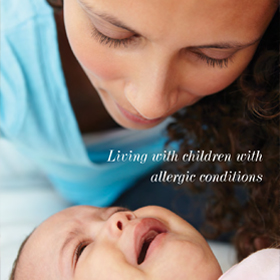Guest Contributor: Dr. Tiffany Taft, Oak Park Behavioral Medicine
Stress is challenging for anyone and when caring for someone with chronic allergic conditions it can be debilitating. We found this helpful article on one of our favorite sites — ItchyLittleWorld.com (“eczema, allergies and asthma…oh my!”) — by clinical psychologist Dr. Tiffany Taft who emphasizes the need to care for ourselves so that we can more healthily, happily and effectively care for others.
Questions? Email Dr. Taft at TTaft@opbmed.com and follow Oak Park Behavioral Medicine on Facebook and Twitter.com/OPBMed.
Ask any parent of a child with a chronic illness if they experience stress and I suspect that they’d look at you like you were a bit off your rocker. Of course caring for a child with an illness comes with stress, and this stress can impact the whole household. But what is “stress,” exactly? And more specifically, what is “caregiver stress” and how does it relate to things like illness symptoms, its treatment, and the quality of the lives of those affected by the illness? Researchers across the globe have focused efforts on understanding parent-caregiver stress, with many studies on parents of children living with allergic conditions such as asthma, food allergies, and eczema. My personal research is with parents of children affected by Eosinophilic Gastrointestinal Disorders (EGIDs) such as eosinophilic esophagitis.
Before I continue, I should say that stress isn’t always a bad thing. It can be a great motivator. But there is a tipping point where stress becomes a burden on our mental and physical resources, making doing the simplest tasks feel like climbing a mountain. It’s when stress passes this line, which may be different for you than the parent sitting next to you, that we see many negative effects.
So what do we know about caregiver stress, in general? We know we can categorize caregiver stress four ways:
- Communication, such as explaining your child’s food allergies to others.
- Emotional functioning, such as worrying about the long term impact of asthma.
- Managing Medical Care, including making decisions about what eczema medication your child will take.
- Role functioning, such as attending to the needs of your other children or spouse.
This may seem to over-simplify individual experiences, but it helps us ensure everyone who is researching caregiver stress is measuring the same thing so we can make meaningful comparisons.
Researchers have identified something called “Caregiver Stress Syndrome” which is characterized by grief, anxiety and feelings of helplessness. People with Caregiver Stress Syndrome may also experience insomnia (rates as high as 86%) and fatigue related to taking care of an ill loved one. These symptoms result from both acute, or immediate, stress such as a serious flare up in symptoms requiring hospitalization and chronic, long term, stress from managing day-to-day tasks like taking medications or calling doctor’s offices for test results.
When we survey parents experiencing caregiver stress we hear that they engage in fewer enjoyable activities, socialize less, and engage in less self-care. Parents also report more personal health concerns, depression, marriage issues, and family discord. In other words, the quality of their life is reduced significantly. We know that children who live with allergic conditions tend to report greater impact on their daily life than children with other chronic illnesses which may, in part, be due to a feeling of “living with risk” that is inherent in many of these conditions – and a feeling most likely shared by their parents.
Here are some of the things parents of children with allergic conditions tell us:
Mothers of children with eczema report greater levels of caregiver stress than parents of children with Type 1 diabetes or deafness, and similar stress levels of those with children using tube feedings.
- In parents of children with food allergies, 41% report significant caregiver stress, 49% state that food allergy reduces the family’s social activities, and 34% report reduced school attendance. The majority also report a significant impact on family meals.
- Parents of children with asthma often report a sense of loss of self, fatigue, and exhaustion. Interestingly, depression and parent stress predict increases in their child’s asthma symptoms (inflammation) regardless of the child’s psychological state.
- 46% of parents of children with EGIDs report significant anxiety and 28% experience symptoms of depression. Parent mental health predicted caregiver stress more than the child’s illness severity or treatments.
- When comparing both parents, mothers of children with food allergies report a greater negative effect on their quality of life, more anxiety and caregiver stress than fathers.
This is a very important topic and I’ve only covered a tiny portion of what’s at play in the lives of children living with allergic conditions and the parents who care for them. The take-home point of this post is that being a caregiver is stressful, and while that stress may motivate you to seek the best treatment and opportunities for your child, it’s vital to check-in with yourself and evaluate if stress has crossed that line into negatively affecting your life. How is your mental well-being? Your sleep? Your support system? How do you cope with stress and does it help? If you conclude that you’re feeling overwhelmed, you may want to consider help from a professional with expertise in helping parent-caregivers cope. We must take care of ourselves before we can take care of others.
About our Guest Contributor: Dr. Tiffany Taft is a licensed clinical psychologist who specializes in the psychology of chronic illness. She is co-owner of Oak Park Behavioral Medicine LLC, a private practice near Chicago, where she works with children and adults with chronic conditions. Dr. Taft is also an Assistant Professor at Northwestern University Feinberg School of Medicine, where she worked in the division of gastroenterology for 8 years doing research and seeing clients with chronic digestive conditions. She published the first study evaluating caregiver stress in parents of children with EGIDs, as well as several other studies on the psychology and social effects of chronic digestive illness. Dr. Taft is a 2009 graduate from the Chicago School of Professional Psychology and is an active member of the Crohn’s & Colitis Foundation of America, including volunteering at Camp Oasis – a summer camp for children affected by Crohn’s Disease and Ulcerative Colitis.
This article is a Guest Contribution. We include articles contributed by doctors, experts or other individuals who wish to provide helpful information to their patients and the public at large, who respond to our requests to use them as professional resources, or who we feel can give our readers new insights into various topics. Contributors may or may not prefer to remain anonymous and we respect this preference. These resource articles do not in any way imply an endorsement by the guest contributor of VMV HYPOALLERGENICS® or any of its products, services or resource sites—they are intended for informational purposes only. While sometimes written by or with resource professionals, these articles should not be relied on for diagnostic accuracy or applicability to your particular skin, which requires an in-person ocular consultation with a qualified physician. For appropriate care for your skin or other health concerns, please consult your dermatologist and other physicians.





